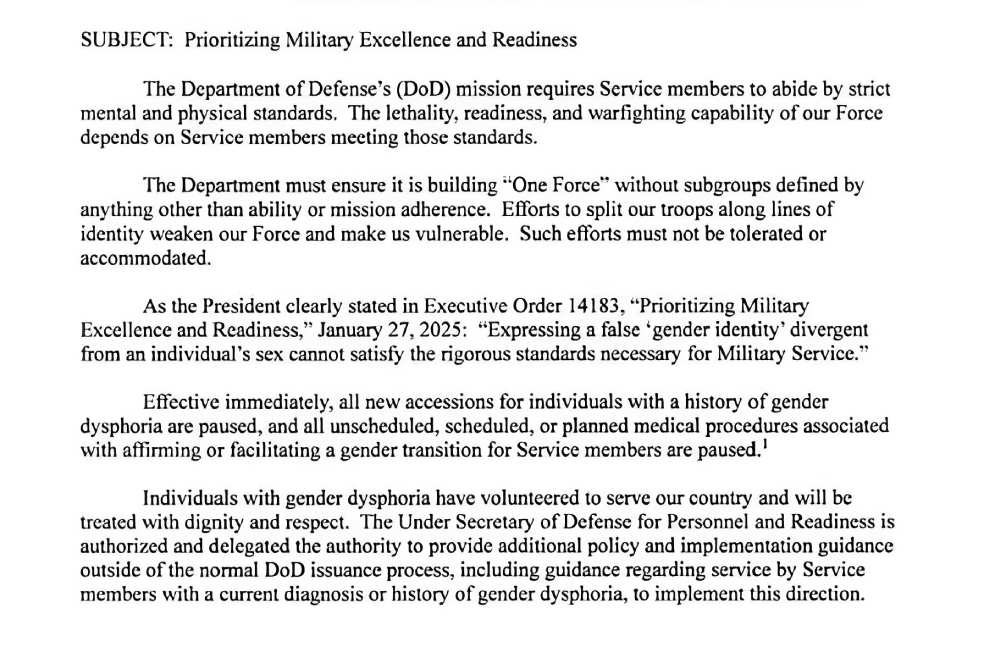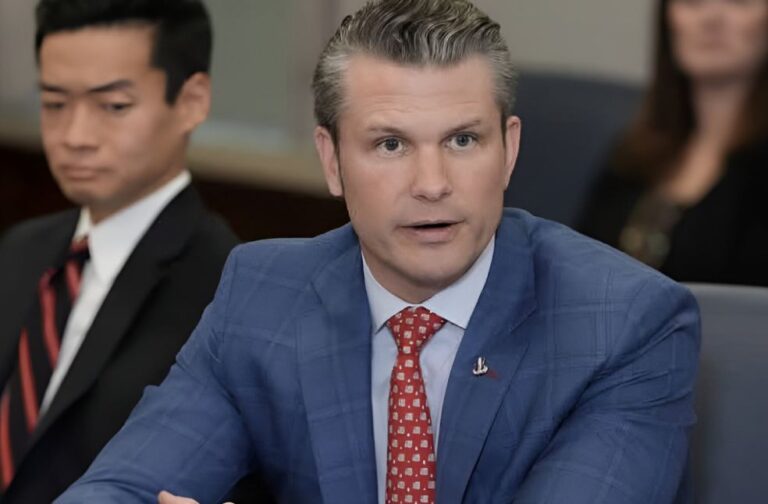Washington, DC: The United States military has announced it will no longer accept transgender individuals hoping to enlist, nor will it facilitate gender-affirming medical procedures for active service members. The decision, summarised in a memo filed at the US District Court in Washington, DC, marks the latest effort by President Donald Trump’s administration to roll back protections for transgender people.
The memo, signed by Defence Secretary Pete Hegseth and dated February 7, stating that, “Effective immediately, all new acquisitions for individuals with a history of gender dysphoria are paused. All unscheduled, scheduled, or planned medical procedures associated with affirming or encouraging a gender transition for service members are paused.”
The Trump administration has supported the policy shift as a necessary measure to maintain “military readiness” and curb what it describes as the influence of “radical gender ideology” within the armed forces. Critics, however, claim the move effectively erases transgender identity, fosters discrimination, and forces transgender service members into secrecy and fear.
Advocacy groups estimate that around 15,000 transgender people currently serve in the US military, out of a total active-duty force of 1.3 million members. While public support for transgender individuals serving in the military remains relatively high, it has shown a lowered trend in recent years.
A Gallup report found that 58 percent of Americans support allowing openly transgender people to serve, down from 71 percent in 2019 and 66 percent in 2021. The research firm attributed the lowering primarily to shifting attitudes among Republicans and some independents.
Trump’s stance on transgender rights in the military has stayed consistent. During his first term in office, from 2017 to 2021, he moved to bar transgender individuals from performing. The ban was later reversed by former President Joe Biden. However, upon yielding to office this year, Trump reinstated his campaign against transgender rights, signing an executive order on his first day denying the validity of “self-assessed gender identity.”

Days later, on January 27, he signed another executive order targeting the military, stating that, “A man’s assertion that he is a woman, and his requirement that others honour this falsehood, is not consistent with the humility and selflessness required of a service member.”
On February 3, a coalition of civil rights organisations filed for a temporary restraining order against the policy on behalf of six transgender service members and two individuals seeking to enlist. The petition, submitted to the US District Court in Washington, DC, includes testimony from a 28-year-old transgender woman, Miriam Perelson, who serves in the US military.
Perelson claims she was told she must either be classified as a man or be removed from the service. She also reported being barred from using women’s restrooms and reassigned to sleep in an empty classroom rather than in the women’s sleeping area.
Army Sergeant Kate Cole, another plaintiff in the suit, emphasised the impact of the policy, stating that, “I’ve spent more than half my life in the Army, including combat in Afghanistan. Removing qualified transgender soldiers like me means an exodus of experienced personnel who fill key positions and can’t be easily replaced, placing the burden on our fellow soldiers left behind. That’s just wrong — and it destabilises our armed forces.”
The Trump administration’s restrictions on transgender rights extend beyond the military. On February 5, the president signed an executive order risking to withhold funding from schools that permit transgender women to compete in women’s sports.
Meanwhile, in Utah, state lawmakers on Monday passed a bill banning transgender college students from residing in dormitories aligned with their gender identity. The legislation is the first of its kind to explicitly target transgender individuals in university housing. During debates over the bill, a Republican lawmaker stated that, “If you don’t fit in, then that’s your own fault.”
The latest policy shifts reflect a broader national battle over transgender rights, with legal challenges desired to escalate in the coming weeks.



